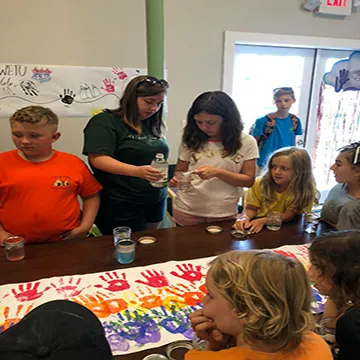Lessons in "Winging It"

Six hours. Thirty-seven campers. And a plan tossed out the window.
That was just her first day. With unexpected camper numbers, frustrated parents, and drastic schedule changes, Carolyn Westgate’s job as director of Camp Wetu, an educational summer program at Mount Hope Farm in Bristol, R.I., presented her with every possible challenge.
“We had to change the way we did things,” Westgate, a self-proclaimed “planner,” says. “We couldn’t have all the campers inside at the same time, so we had to just redo everything.”
A History and Secondary Education double major, member of the Honors Program and former camp counselor, Westgate had plenty of teaching knowledge and was ready to demonstrate her skills in a leadership position. When she applied to be the director of the educational summer program, however, she couldn’t have predicted all the opportunities she would have to use them.
Soon enough, she was thrown into marketing, hiring counselors, and developing curriculum. During camp, she was the go-to person for immediate needs, like distressed campers, parent concerns, and logistics, along with long-term programming and helping to grow the camp through social media.
While a lot of her work was “trial by fire,” Westland says, she witnessed her classroom learning come to life. In the midst of the chaos, she implemented elements of her history classes.
“There is so much rich history at Mount Hope Farm,” Westgate says. “I felt like it was really applying history, not just studying it.”
In the same way that her path at RWU has immersed her in real-world learning, Westgate provided her campers with plenty of experiential learning opportunities, particularly through the camp’s connection with the Pokanoket Tribe. Women from the tribe would lead the campers in a different craft every week.
“Every craft they did they would explain the significance of it to the campers and why it is important to their culture,” Westgate explains.
Members of the tribe would also lead the campers in traditional customs, like a sacred prayer and a tribal friendship dance. They taught campers about their history by sharing sacred landmarks and artifacts.
“The campers' favorite artifact was their form of currency "wampum" which are quahog shells. Campers would collect their own wampum on the shoreline and trade it with the tribe when they came to visit,” Westgate says.
Westgate made sure that every hour was time well spent. “The kids weren’t just doing things to pass the time,” she says. “Everything they were doing there was hands-on and valuable."
Westgate also used key theories from her education classes in her role, particularly the “inquiry-based approach,” which centers lessons around questions for students to explore.
“It was really cool to finally implement it even though I’m not a teacher yet,” Westgate says.
Other key concepts for educators like cultural competency and differentiated instruction were no longer just terms in a textbook once Westgate arrived at Camp Wetu. She recalls working with a child who was unhappy at camp. She and the counselors struggled to help him at first, but ultimately were able to tailor activities to suit his needs. With this individualization, they saw a positive shift in behavior.
“You can see how much they develop and grow in just eight weeks,” Westgate says.
Though unforeseen challenges were stressful at times, they taught Westgate lessons that classroom lectures alone could not, which is why RWU embeds hands-on learning opportunities into the curriculum.
For the fall semester, Westgate is doing her school placement. In the Spring, she will become a full-time student-teacher, providing all the lessons to students of diverse languages and family backgrounds.
Looking back on her first day at Camp Wetu, she’s learned to expect the unexpected.
“It’s so valuable that that happened to me because I feel like the same thing would happen on your first day teaching,” Westgate says. “You can never be prepared for the things you see and hear, but once you do it, you just figure it out as you go.”

